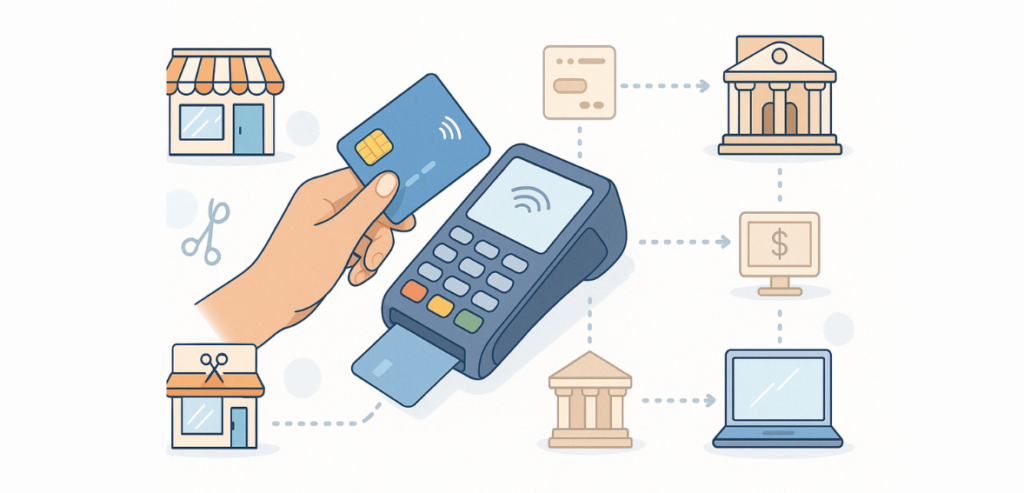Electronic payments are essential for many businesses in today’s cashless society. However, a team of experts ensures these transactions go smoothly behind each Visa swipe, smartphone tap, and online checkout. The unsung hero that connects merchants to the world of digital payment acceptance is the merchant services agent. Merchant services agents combine finance, technology, and relationship-building to support the success of businesses, whether you view them as sales consultants, payment tech specialists, or strategic partners.
This role involves more than just terminal installation; it’s a career based on technical knowledge, negotiation, consulting, and continuing support. It’s cooperative and entrepreneurial, requiring communication skills, business savvy, and problem-solving techniques.
Understanding their potential and impact is essential for anyone considering this expanding field, including business owners curious about what these agents do. As we get started, you’ll learn how agents affect each step of payment acceptance, what skills they develop, and how their work translates into real income potential.
Defining the Merchant Services Agent

A merchant services agent’s primary function is to act as an intermediary between companies and payment processors. These representatives frequently operate as resellers or under Independent Sales Organizations (ISOs), providing tools that enable businesses to take online, mobile, debit, and credit payments. The agent is the expert who determines which gateway, terminal, or service structure best suits the needs and budget of a restaurant owner, retail store, or e-commerce startup.
However, the role is more than just distributing terminals. In their capacity as client advisors, agents examine business type, transaction volume, risk factors, and even branding in order to create the best possible technology and pricing packages. As evidenced by Beacon Payments and CardConnect, agents engage in what amounts to needs-based consulting—rather than mere selling—helping merchants navigate fees, hardware options, and compliance concerns.
Because of their dual focus on client acquisition and retention, agents develop and expand their clientele over time rather than just landing a deal. Agents communicate, make optimization suggestions, and track performance as merchants grow. What sets them apart from one-time vendors is this ongoing collaboration.
Everyday Responsibilities and Client Interactions

Prospecting, presenting, installing, and troubleshooting are all part of a merchant services agent’s day. Usually, it starts with cold calling, networking, referrals, or inbound inquiries to find new leads. Their objective is to find companies that are having trouble with antiquated systems, exorbitant fees, or inadequate integration. Following interest, the agent meets with the business owner to learn about their operations, transaction types, peak volumes, and areas of pain.
Next comes solution crafting. Agents craft customized packages tailored to each merchant’s specific needs and expected transaction patterns. This package includes terminal hardware, POS integrations, mobile readers, gateway options, and fee structures. Their role is not merely technical; they must also be persuasive in describing how a new system will streamline checkout, guard against fraud, guarantee PCI compliance, and eventually result in cost savings.
Negotiation is necessary to close a deal; agents balance contract terms, equipment fees, markup levels, and processor rates. After signing the contract, agents make sure the merchant is operational by either handling the installation themselves or transferring it to onboarding teams.
The post-purchase relationship then starts, during which agents assist with upgrades, offer support, and may renegotiate terms as the merchant expands. Long-term residual income is created by this relationship-first strategy; agents profit from both initial sales and continuing transaction volume as their clientele processes payments.
Key Skills That Drive Success
What makes a great merchant services agent? A hybrid of interpersonal finesse, technical competence, and business judgement.
Agents must first pay attention to and comprehend the needs of their clients. Asking insightful questions, such as about e-commerce versus in-person sales or busy versus slow days, can help unearth opportunities and foster trust. A top agent frames solutions around time savings, enhancing customer experience, or lowering fraud risk; simply reciting a feature list is insufficient.
The second is the fluency of the product. Agents must be up to date on the latest payment technologies, including online gateway APIs, NFC/contactless, integrated point-of-sale systems, and EMV chip cards. Part of staying sharp is reading provider documentation and going to product training.
The ability to negotiate is equally important. Agents have to strike a balance between providing merchants with competitive deals and maintaining a sufficient margin to generate steady revenue. A well-executed negotiation respects margins and guarantees value for both sides.
Lastly, relationship-building and responsiveness are essential for long-term client management. Agents provide system audits, suggest new features, check in on a regular basis, and address queries or problems promptly. This continuous care encourages referrals, maintains client loyalty, and eventually generates sizable residual income.
Income Structure and Earning Potential

One of the most attractive features of being a merchant services agent is the potential for high, ongoing income—far beyond one-time sales.
Agents usually receive two types of income: residual income based on the volume of client transactions and upfront commissions on equipment or account setup. Depending on the provider and agent tier, residual rates can vary greatly, ranging from a fraction of a percent to several percentage points.
For example, agents may buy wholesale processing rates at 1.79% + $0.20 per transaction and resell at 2.25% + $0.25, keeping the difference for themselves on each transaction indefinitely. That could result in $70 in recurring revenue each month for a small business processing $15,000. Without selling anything else, the agent could make over $8,000 a year with ten of these clients.
Top agents can make six figures overall, particularly if they develop sizable merchant portfolios. According to Beacon Payments, independent agents can earn over six figures by combining residuals and upfront bonuses. Stories of agents reaching $150,000 a year after building a solid book of business are shared in industry Reddit discussions, which support this.
The model rewards continuous effort: more clients equals more recurring income; the longer clients stay, the higher the residual stack climbs. It’s why earning potential is labeled “unlimited” in many ISO agent programs.
Challenges and Pitfalls to Navigate
This path has hurdles despite its high earning potential. First, there may be fierce competition. You’ll often find yourself up against other sales reps, flashy all-in-one deals from POS companies, or even the payment processors themselves. The easiest way to stand out and gain trust is to focus on a specific market—whether it’s a type of business you understand well or a local area where you’ve built relationships.
Second, the transparency and support of contracts vary greatly amongst agent programs. Some agreements contain excessive performance qualifiers, perplexing splits, or residual cliffs. Agents must carefully review contracts to make sure that program expectations and compensation are clear.
Third, there are actual variations in income. In the beginning, it’s common to make a lot of calls and see very little income—it takes time before the commissions start to grow. Building a sustainable base frequently requires patience and momentum. Without careful portfolio management, plans with erratic clients or volume fluctuations may introduce unpredictability.
Finally, reputation is crucial. Due to previous customer complaints, the payments industry occasionally has a “shady” reputation. Good agents know it’s not worth holding onto clients who only care about getting the cheapest rate and love to argue over every detail. It takes professionalism and moral sales techniques to get past this reputational obstacle.
How to Start and Grow in the Role
If this role appeals to you, the first step is usually to align with a processor or ISO that is supportive and provides marketing materials, onboarding tools, and training. As their residual income increases, some agents gradually switch from part-time work to other jobs. Product lines, pricing schemes, sales strategies, and compliance (such as PCI DSS) are all commonly covered in training.
Your credibility is increased by attending industry meetings, earning a certification, and reading processor documentation. The next step is to prospect and target particular industries, such as field services, e-commerce stores, and restaurant point of sale systems, where you can customize solutions to meet industry demands. Exploring what it means to be a successful local agent can further highlight the impact of community presence and hands-on support. Prompt follow-up, openness, and providing value to their operations increase the likelihood that new clients will stick around and recommend you to others.
Upgrading to a higher-tier agent status as your portfolio expands frequently entails larger splits, chances for team building, and even the possibility of launching your sub-ISO. Scaling is more about managing a network of sub-agents and developing stronger merchant relationships than it is about making more calls.
The Agent’s Broader Impact on Businesses and Payments

Good merchant services agents aren’t just selling hardware; they’re enabling commerce, driving customer experience, and safeguarding financial data. They offer advice on fraud prevention tools, help small businesses set up safe, compliant systems to accept payments, and recommend improvements to online or mobile payments to keep up with digital standards.
To put it briefly, they assist companies in expanding beyond cash registers. To help merchants operate with confidence and prevent unexpected fees, they also play a crucial educational role by demythologizing interchange fees, PCI standards, and processing terms. When dealing with processors that have complicated pricing and disclosures, a knowledgeable agent helps level the playing field.
Agents support the foundation of a digital economy and modernize small business ecosystems. Without them, a large number of nearby companies may continue to use antiquated, pricy, or unsafe payment methods.
Conclusion
At the intersection of sales, technology, finance, and service, a merchant services agent holds a special position. Curiosity, empathy, knowledge, and unwavering perseverance are necessary for this position. It provides financial upside and entrepreneurial control for those who succeed, particularly through recurring revenue based on client success.
However, it’s also a path that carries responsibility: providing clear pricing, acting with integrity, helping the success of merchants, and proactively managing operational risks. The most successful agents are dependable counsellors who assist entrepreneurs, expedite payments, and enhance customer service.
A career as a merchant services agent might be the answer for you if you’re interested in combining tech proficiency with the opportunity to build real-world relationships, earn scalable income, and have a genuine impact on small businesses. When your clients succeed, so do you.







